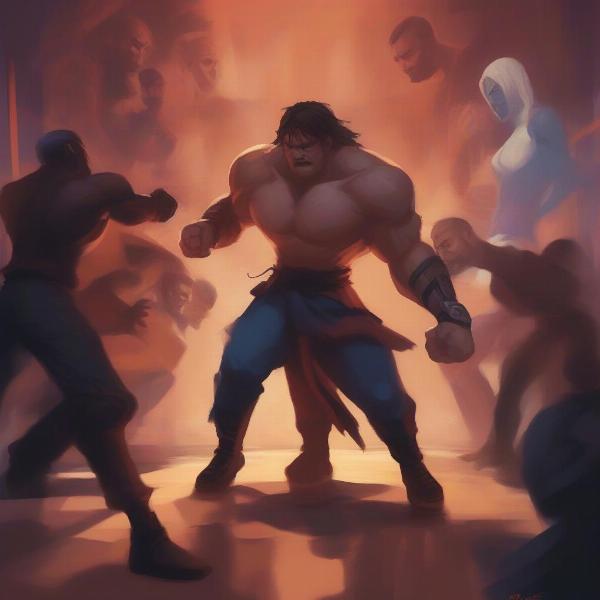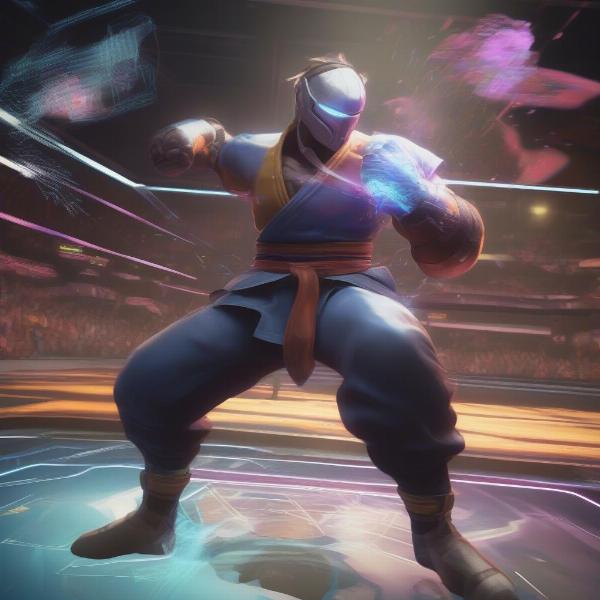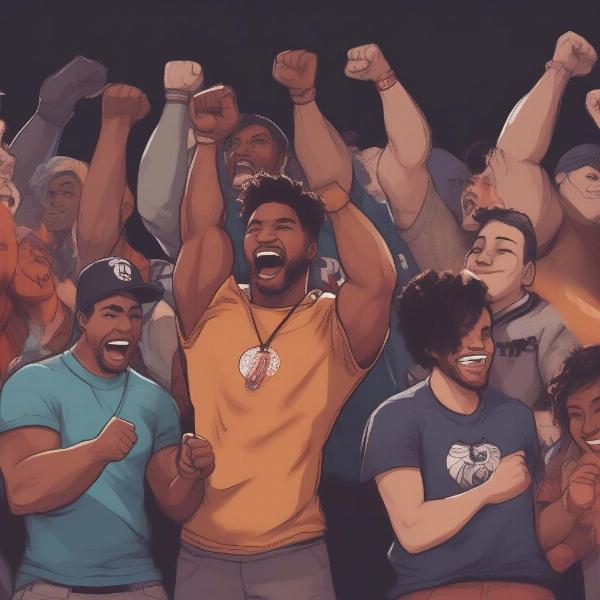Fighting games, with their intricate mechanics and demanding head-to-head battles, can be a thrilling experience, but what if you’re battling not only your opponent but also your own inner critic? At SupremeDuelist.blog, we delve into the heart of gaming culture, and today we are addressing a common concern. Can someone with self-esteem issues still enjoy and thrive in the world of fighting games? This article explores how to navigate the competitive landscape while protecting your mental well-being.
This blog post will address the unique challenges faced by players with self-esteem issues in the fighting game community (FGC). We will explore strategies for managing frustration, celebrating small victories, and fostering a healthier relationship with the game, and of course ourselves. We will provide a supportive space where you can learn how to enjoy fighting games without letting them negatively impact your sense of self-worth, and that it is possible to enjoy the game, even if you are prone to a bit of self doubt, or even some major self esteem issues.
Understanding the Link Between Fighting Games and Self-Esteem
The very nature of fighting games is based on direct competition, where wins and losses are clearly defined. For individuals already struggling with self-esteem, this can become a breeding ground for negative self-talk and feelings of inadequacy. Every defeat can feel like confirmation of their own perceived flaws, further fueling self-doubt, and creating a vicious cycle of losing and internal criticism. The fast paced nature of the game can add to this feeling as there is not always a lot of time to consider what to do differently.
Furthermore, the online environment of fighting games can be particularly unforgiving. Anonymous opponents may resort to trash talk, further eroding a vulnerable player’s self-confidence. Even without direct taunts, observing other players’ skill levels might lead you to constantly compare yourself unfavorably, spiraling into further self-criticism. This is a very real issue in the fighting game community as many players hide behind anonymity to say things that they would normally not be so comfortable saying face-to-face. This all can be quite challenging for people who are more introverted, or have existing self esteem challenges.
 fighter-struggling-with-self-doubt
fighter-struggling-with-self-doubt
Is it Possible to Play Fighting Games Without Your Self Esteem Taking a Hit?
The good news is, yes. Absolutely! While fighting games might present a unique set of psychological challenges, they also offer incredible opportunities for personal growth. The key lies in adopting a growth mindset focused on learning and improvement rather than solely on wins and losses. This shift in perspective can be transformative for players of any skill level, and is even more important for those struggling with their self esteem. Learning to appreciate the process of improvement can help to protect your sense of self worth.
Moreover, you can implement mental strategies to distance yourself from the toxic tendencies that could affect your game. Learning to mute opponents, and understand that things said in game are not always a representation of how someone feels is really key. It’s just part of the game, and learning to not take it personally is something that will not only help you in fighting games but in life in general.
Strategies for Maintaining Self-Esteem While Playing
Let’s delve into some practical strategies for enjoying fighting games while safeguarding your self-esteem. Remember, it’s about creating a positive and sustainable gaming experience. Remember that there is so much that goes into a fighting game, and it should be all about having fun and enjoying the moment.
- Focus on Learning, Not Winning: This is perhaps the most crucial mindset shift. Instead of fixating on victories, prioritize learning new techniques, practicing combos, and understanding your opponent’s strategies. Celebrate small victories like landing a difficult combo or successfully blocking a mix-up. Focus on incremental progress and celebrate the small milestones.
- Set Realistic Goals: Don’t expect to become a top player overnight. Set small, achievable goals for each play session. This could be as simple as learning a new combo, or improving on your defense for a specific character. Avoid comparing your progress to others and focus solely on improving your own skill level.
- Limit Your Exposure to Toxic Players: Mute or block players who engage in abusive or negative behavior. Don’t hesitate to leave a match if the environment becomes toxic. It is much better to safeguard your mental health than it is to keep playing with toxic people.
- Find a Supportive Community: Surround yourself with positive and encouraging players. Join online communities where players share tips, offer support, and celebrate each other’s progress. It can also be a great way to find more people to play with that are supportive and helpful, rather than always playing with random opponents.
- Take Breaks When Needed: If you feel overwhelmed, frustrated, or are noticing negative self-talk, take a break. Step away from the game and do something relaxing. Come back when you are feeling refreshed and ready.
- Practice Self-Compassion: Treat yourself with the same kindness and understanding you would offer a friend. Everyone makes mistakes and has bad days. Don’t beat yourself up over losses. Remember, it’s just a game!
How Can I Deal With The Competitive Nature of Fighting Games?
The competitive nature of fighting games can be a double-edged sword. It can drive you to improve, but it can also amplify self-esteem issues if you don’t approach it mindfully. The key is to reframe your perspective on competition. Instead of seeing it as a measure of your self-worth, view it as an opportunity to learn, adapt, and grow.
Learning to embrace your weaknesses, and find areas you want to improve is another good way to go. Recognizing what you need to do to get better is a huge part of the process, and it is something that will also serve you well in life outside of just video games. It’s all about personal growth and becoming the best version of yourself.
 character-learning-from-mistakes
character-learning-from-mistakes
The Power of Mindset in Fighting Games
Your mindset plays a crucial role in how you experience fighting games. A fixed mindset, which believes abilities are innate and unchangeable, can lead to discouragement and self-doubt when facing challenges. On the other hand, a growth mindset, which embraces the idea that skills can be developed through hard work and dedication, fosters resilience and a passion for learning. Here are a few things you can do to foster a growth mindset.
- Focus on the Process: Shift your focus from winning to enjoying the process of learning and improving. Every game, win or lose, is an opportunity to learn something new.
- Embrace Challenges: Instead of avoiding difficult opponents, view them as opportunities for growth. Facing challenges can often be frustrating, but it can lead to exponential growth if you can see past the frustration.
- View Mistakes as Opportunities: Mistakes are a natural part of the learning process. Don’t see them as failures; instead, see them as opportunities to learn and grow. Analyze your mistakes, learn from them, and improve in the next game.
- Cultivate Patience: Progress in fighting games takes time and effort. Be patient with yourself and celebrate every step forward, no matter how small.
“Remember that every great player was once a beginner. Don’t let the fear of failure stop you from playing fighting games. Embrace the challenge, learn from your losses, and most importantly, have fun.” – Dr. Anya Petrova, Sports Psychologist
Are There Any Fighting Games That Are Better For People With Low Self Esteem?
While the core mechanics of fighting games are generally consistent, some games may be more approachable and less overwhelming for beginners and those with self-esteem issues. Games with simplified control schemes, comprehensive tutorials, and active player communities can offer a more supportive environment. Games with a slower pace may also allow you more time to process what is happening on screen, and react without feeling rushed, something that can really help people with self esteem challenges.
Additionally, games that foster a sense of community or provide in-game rewards for progress and learning can be more rewarding, which can provide great positive reinforcement. You could also consider playing a game that is more PVE focused to help you develop the core skills, and not feel pressured by a human opponent.
The FGC Can Be a Positive Space
While toxicity exists within the FGC, it’s important to remember that the community is also full of incredibly supportive, knowledgeable, and passionate individuals. By finding your niche within the FGC and focusing on building positive connections, you can have a very enriching experience. Remember, your journey into fighting games should be something that you enjoy and feel like you’re a part of, not something that makes you feel bad about yourself.
The key is to actively seek out the kind of communities you want to be a part of. It may take some searching, but eventually you’ll find people who will help you to improve, while being positive and supportive. And remember that you are in control of your own experience, so you can always block or mute anyone that you don’t feel comfortable playing with or talking to.
“The journey of improvement in fighting games is not always linear, you will experience peaks and valleys. The most important thing is to keep learning, keep growing, and keep enjoying the process.” – Marcus ‘The Strategist’ Li, Professional Fighting Game Analyst
What If I Feel Like I Am Never Good Enough?
It is important to remember that everyone learns and progresses at their own pace. There are so many factors that go into getting good at something, and that it’s all about the process of learning and becoming better. If you are finding that your feelings are overwhelming you, or that the game is negatively impacting your mental health, it is important to step back and consider what you can do to better manage these feelings. Consider seeking professional help to help you address those feelings, so that you can enjoy all that the world of fighting games has to offer.
 diverse-group-of-players-cheering
diverse-group-of-players-cheering
Conclusion: Enjoying the Fight While Protecting Your Self-Esteem
So, can you play fighting games with self-esteem issues? Absolutely. It requires a shift in mindset, a focus on personal growth, and a willingness to embrace the learning process. Remember that it’s just a game, and if it is causing you to feel negatively about yourself, then maybe you need to re-evaluate how you approach the game. At SupremeDuelist.blog, we believe that gaming should be enjoyable and enriching. By implementing these strategies, you can navigate the competitive world of fighting games while protecting your self-esteem. So pick up that controller, and remember to have fun!
Ultimately, engaging with fighting games is about more than just winning, and should be all about personal growth, community, and fun. If you are finding that you are struggling with negative feelings, or have questions about the process, then be sure to look for help and support, and always remember that you have the power to shape your gaming experience into something positive.
Leave a Reply